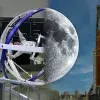Resolving the water crisis in the city of Monterrey is on the way to being possible because of Digital Water, a prototype designed to predict shortages and possible demands for water by using cooperative artificial intelligence.
The proposal allowed Digital Water to gain second place in the Atos IT Challenge in July this year and thus become the first Latin American team ever to reach the final of the competition.
Atos is a world leader in digital transformation, with more than 110,000 employees in 73 countries; the company created the competition in 2012 so that students from all over the world could develop connected applications for intelligent mobility, interactive media, and artificial intelligence.
Digital Water also won an investment prize from Open17, an initiative developed by the United Nations (UN).
THE PROJECT LEADER
The project is led by Arturo Arellano, a recent graduate of the Business Engineering and Information Technology degree at Tec’s Monterrey campus who, together with his classmates, took on the challenge of addressing this problem.
The idea for the prototype was thought up almost a year ago while participating in a competition organized by the Tecnológico de Monterrey, Water and Drainage in Monterrey, and the artificial intelligence company SparkCognition.
The prototype, which predicts the demand for water that may be needed tomorrow or in the coming months, was created using artificial intelligence, via a computer code, said the Tec graduate (EXATEC).
“What is the prediction for the amount of water that the city will need? That is our main objective: this helps us to make the necessary operational changes on a day-to-day basis.
“The second solution is to detect water leakage by using artificial intelligence and very small sensors, which make this detection cheaper,” explained Arturo Arellano.

The Atos IT Challenge win consisted of a cash prize of 5,000 euros, while Open17 provided a total of 1,000 Swiss francs.
Arturo added that both prizes will provide the team with the opportunity to continue working on the development of the prototype in order to scale it up to a new stage of testing.
“The water industry in Mexico is blocked up; the real problem, if we talk about what needs to be changed, is the value of water. People don’t understand its value and that causes us many other problems,” he acknowledged.
SHARING THE VALUE OF WATER
Arellano said that currently the project is focused on working with Water and Drainage, as well as the State Water Agency.
The aim of all this is to start a paradigm shift in which the greatest challenge will be to share the message that, without water, we cannot live as we have all done so far.
“The interest in developing this prototype comes from an interest in learning new things but, above all, to be able to solve a social problem using technology,” said the graduate.
He added that participating in the competitions taught him great lessons, including the ability to overcome fears and face complex issues that require great attention to detail.
“I want to emphasize that if you participate in these types of competitions, they teach you to constantly be learning, give you the tools to learn well, and to be able to resolve your own difficulties - and your mentors end up becoming your friends,” he acknowledged.
Digital Water is currently in the testing stage. To reach this point, the team has collaborated with Water and Drainage in Monterrey, the Nuevo León Council and the San Pedro Garza García Ministry of Innovation.
“We were very happy to be able to represent the Tec, Mexico, and Spanish-speakers in these very important competitions.
“For engineering, at least, it is a very complicated competition because of just how specialized it is, but we just really wanted to do it,” he concluded.
YOU MAY ALSO BE INTERESTED IN:





